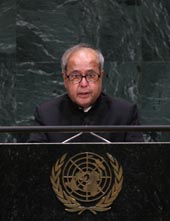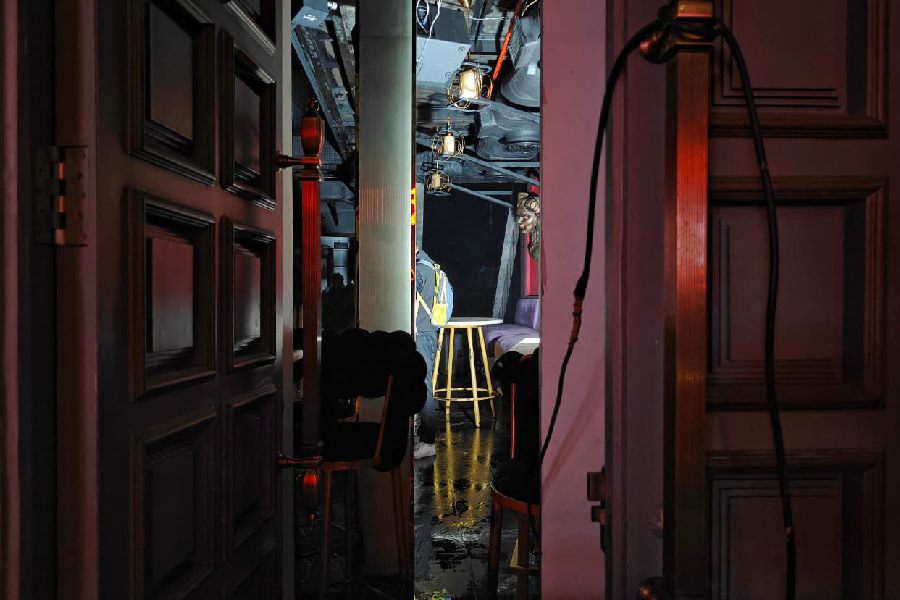 |
| Mukherjee addresses the General Assembly on October 1 |
New York, Oct. 7: India is firmly and visibly back on the world stage.
Sixteen years after being forced to pawn its gold reserves and nine years after being treated as a rogue state for the Pokhran II nuclear tests, India’s place in the world envisioned by early post-Independence leaders like Jawaharlal Nehru has once again been recognised by the international community.
As the UN General Assembly wound up its annual talking marathon on Wednesday, Pranab Mukherjee, the leader of the Indian delegation, strode the stage during a seven-day stretch among 100 heads of state and government and 80 foreign ministers as the representative of a truly emerging great power.
UPA chairperson Sonia Gandhi provided grace to the proceedings: at the diverse UN community, she became a symbol of India’s capacity to assimilate multiethnic, multi-religious and multicultural forces that has been demonstrated throughout the country’s history.
French President Nicolas Sarkozy’s proposal, as preparations were underway for this year’s General Assembly, that the Group of Eight (G8) rich industrialised countries should become the G13 lent considerable credibility to India’s new image as a growing global power.
Sarkozy said India, China, Mexico, Brazil and South Africa should be added to the existing group of leading industrialised countries. “I want the G8 to become the G13.”
The Myanmarese junta’s decision to heed Mukherjee’s advice and act on his four-point plan to defuse their domestic crisis earned India the respect of the international community.
Not since the Korean war over half a century ago has any Indian attempt at conflict resolution anywhere been successful. It was an unmitigated disaster in Sri Lanka with the Indian Peacekeeping Force in the doldrums and, more recently, Delhi had to change horses midstream in Nepal.
If Mukherjee’s Myanmar initiative brings results, it will add prestige to India and enhance its potential as an honest broker in global conflicts.
While the heads of state and government were delivering their homilies at the UN, India’s commerce minister Kamal Nath was meeting his key counterparts such as US trade representative Susan Schwab and Brazil’s minister for external relations Celso Amorim.
Those meetings established India — along with the US, the European Union and Brazil — as the lynchpin of the stalled world trade negotiations.
In the parlance of international commerce, this group of four nations is being referred to as the Group of Four (G4).
This year’s General Assembly, meanwhile, saw the virtual demise of the other G4, namely, India, Brazil, Japan and Germany, which initiated UN Security Council reform two years ago.
That G4 initiative helped focus the attention of the international community on the need to bring in India and others as permanent members of the Security Council.
With a change of government in Germany and with the US practically weaning away Japan from the group, the G4 for Security Council reform is now a pale shadow of what it was two years ago.
The final days of the 61st General Assembly and the opening week of the new Assembly, however, showed that though the G4 may be dead, Security Council reform is alive.
India, Brazil and South Africa will together mobilise support for a new draft resolution they have sponsored in the General Assembly “aimed at the immediate launching of elements-based, result-oriented inter-governmental negotiations for the expansion of the Security Council”.
This was announced after Mukherjee met Amorim and South African foreign minister Nkosazana Dlamini-Zuma here last week under the umbrella of the India-Brazil-South Africa (IBSA) group.
It was also a week when India became integral to the global effort to tackle climate change.
UN secretary-general Ban Ki-Moon had personally requested Prime Minister Manmohan Singh to attend a high-level meeting he convened on climate change on the eve of the opening of the General Assembly.
Singh could not attend, but he sent finance minister P. Chidambaram, who has been designated the Prime Minister’s special envoy on climate change in view of India’s role in the process.
At the same time, US President George W. Bush was equally keen that India should be among the select group of 20 countries he invited for a meeting on the subject at the state department. Mukherjee represented India at that meeting.
During the first three decades or so as a republic, India had a voice in the world, but many saw it as a nagging, negative voice.
Then there was a perceptible decline in India’s role in the world: the lowest point was when Japan trounced India in a vote in the General Assembly for a Security Council seat in 1996.
India has now regained its voice, this time as a mature member of the international community, wooed by everyone from the US and Iran to Japan and Cuba.











